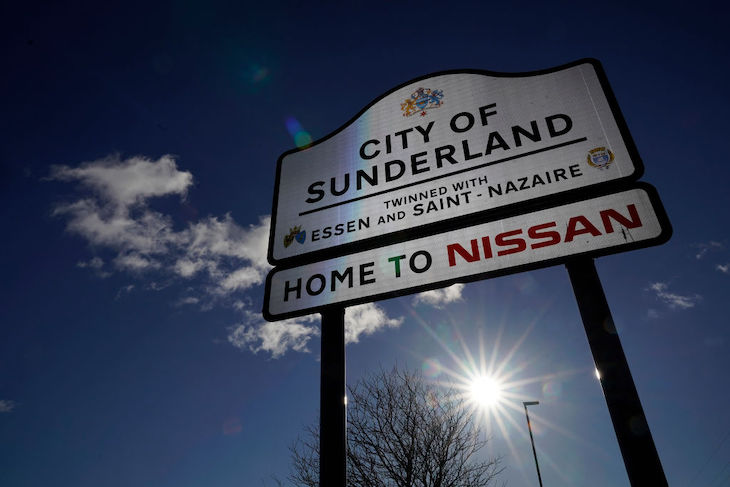Nissan has announced that hundreds of jobs will be cut at its Sunderland plant. The Japanese auto-maker said the lay-offs would be in the form of ‘voluntary redundancies’. The move is part of the beleaguered corporate behemoth’s plan to reduce its global workforce by 15 per cent following several disastrous years, not least because of slow demand for its fleet of electric cars.
Some sympathy is due perhaps, at least for Nissan in the UK
While the cuts only affect four per cent of the plant’s 6,000 workers, the question now is whether this is just the start. So serious is the state of Nissan’s finances – it announced losses of $4.5 billion (£3.3 billion) in 2024, with this year not expected to be any better – that it would be foolish to assume this is where it will end.
The company has maintained that the Sunderland plant is at the heart of its corporate strategy and it justified the lay-offs as necessary to produce a ‘leaner more flexible’ operation. Football mad Mackems though might note that these comments sound uncomfortably like the endorsements football club chairmen give under-fire managers days before they, well, fire them. There are certainly reasons to be anxious: on the same day Nissan announced the Sunderland lay-offs it was reported that the company had asked some suppliers in the UK and EU to delay payments to free up short-term funds.
The importance of Nissan to the Sunderland area is hard to overstate. Thousands of people are directly employed at the plant with an additional 4,000 jobs in the city reliant on the company in some way. By staying put in Sunderland, Nissan has bucked the trend in an area synonymous with declining industry. Its presence has acted as a symbol of hope and pride for almost 40 years now. Nissan has been a sponsor of Sunderland FC and runs the Nissan Academy offering engineering courses and apprenticeships for students amongst many other good works. But what happens if it shuts up shop? The prospects for Sunderland look bleak.
Despite recent difficulties, the company is still officially bullish about its future in the region and has ambitious plans. These include the ‘Arc’ business strategy, which it claims will transform the process of electric car production and maximise efficiency and profits. To this end the company has invested a billion pounds in a nearby battery plant to supply its new range of EVs.
The problem is that none of this will work if customers are not interested and Nissan has been haemorrhaging sales to the much ‘leaner and more flexible’ Chinese competitors for years. The company, which once looked like the future, has been characterised of late by strategic missteps, complacency, and missed opportunities. It has been a long time since Nissan’s confident forward thinking corporate rhetoric has matched reality.
Partly as a result of its tarnished reputation, the reaction to Nissan’s plight here in Japan has been mixed. Emblematic companies are expected to do the country proud not embarrass it and Nissan has done rather too much of the latter in recent years. The Carlos Ghosn affair was especially wounding. Once seen as the company’s likely saviour, his ‘great escape’ from police custody inside a musical instrument box in 2019 was as farcical as it was humiliating.
There is a feeling here that the company is its own worst enemy and may be beyond saving. The Japanese government tried to intervene to salvage Nissan with support for a once unthinkable merger with Honda and the courting of Elon Musk as a potential saviour. Both schemes failed, possibly because the principles took a look at Nissan’s books and drove off at speed.
Some sympathy is due perhaps, at least for Nissan in the UK, where the huge difficulties resulting from the ever-changing diktats of climate-obsessed governments (Conservative and Labour) have put the industry under great strain. The wholly unnecessary set of circumstances that has led the UK to have among the highest industrial energy prices in the world makes plants like Sunderland vulnerable when its owners are struggling in a fiercely competitive market.
It would be a massive reputational embarrassment for Nissan if it were to withdraw or dramatically scale back its operations in Sunderland, and no one is suggesting that such an eventuality is imminent. Still, it might be wise to think of this week’s announcement as a warning and a clarion call for sensible policy making. One would hope that the Energy Secretary Ed Miliband is listening carefully.








Comments